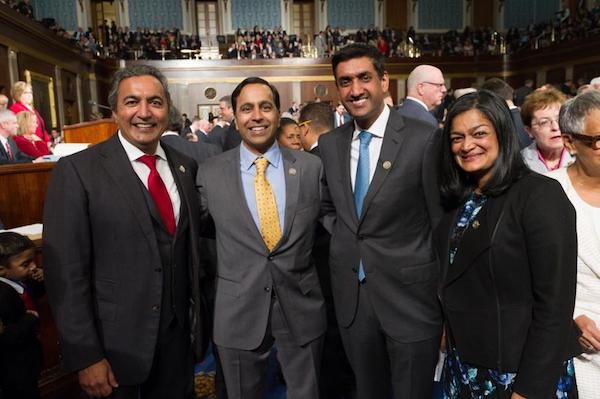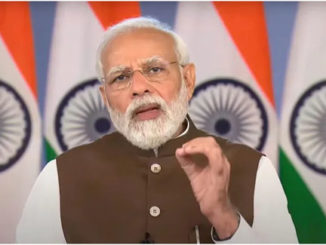
Indian Americans triumphed in state and local elections across the country in elections this month in another demonstration of the community’s growing political influence, engagement and organization. From Washington State to New Jersey, Indian Americans emerged victorious in some of the most competitive races in the country, many of which carried national implications. In more than one race, candidates overcame brazen acts of racism targeting their Indian American heritage and prevailed at the polls. Indian American women comprised the majority the winners.
While the community has achieved success in the United States in several arenas like medicine, technology and business, its members are just beginning to leave their mark in the public realm. To be sure, Indian Americans like Bobby Jindal and Nikki Haley have become familiar names over time, but as former governors with national profiles, they are the exception rather than the rule. (Haley now serves as President Trump’s U.N. ambassador).
On the federal level, the diaspora hit an important milestone in 2016: Indian Americans constitute 1% of the U.S. population and now constitute 1% of the U.S. Congress. Elections last year witnessed the number of Indian Americans serving in the legislative branch jump from one to five, with Reps. Pramilia Jayapal (D-WA), Raja Krishnamoorthi (D-IL), Ro Khanna (D-CA) and Sen. Kamala Harris (D-CA) joining Rep. Ami Bera (D-CA) on Capitol Hill to form what some have christened the “Samosa Caucus.”
In total, staggering 25 Indian American candidates were elected or re-elected to various state and local offices across the United States, the biggest wave to date. Of these, fifteen are women. Sixteen of the twenty-five were elected in New Jersey alone — Raj Mukherji was re-elected to the New Jersey State Assembly while Vin Gopal was elected to the state Senate in a huge upset against the Republican incumbent.
This month’s election victories also demonstrated that Indian American candidates have mainstream political appeal in the United States, capable of assembling broad coalitions of voters comprised of diverse cross sections of the constituencies they now represent. In other words, these candidates did not rely on Indian American voters for their electoral victories.
Deepak Raj and Raj Goyle, co-founders of Impact, a new initiative that closely monitored the 2017 elections, offer a compelling explanation behind the recent surge of Indian Americans successfully running for public office.
“At a time when so many of our values are under attack, Indian Americans are stepping up to run, win, and lead. Last Tuesday, 25 of them won their elections in New Jersey, North Carolina, Tennessee, and Washington State. We already know of 50 candidates on the ballot next November — so it is critical that we lay the groundwork now to elect the most viable candidates who reflect our community’s values. Our community is on the rise.” Goyle became the first Indian American elected to office in Kansas, serving two terms in the state legislature from 2006-2010.
Congresswoman Jayapal, the first Indian American woman to serve in both the Washington state legislature and the U.S. House of Representatives, is encouraged by the groundswell of Indian Americans winning elections across the country. “I’m thrilled to see so many Indian-Americans running for office. In the end, I believe you get better policy when you have voices that represent the whole community at the table. I believe more voters will get engaged if they can see themselves in their elected officials.”
Ohio State Representative Niraj Antani (R), the youngest Indian American elected official in the United States, sums it by saying, “Holding political power for the Indian American community is vital to our future.”
Here is a closer look at some of those elected earlier this month.
State Senator-elect Manka Dhingra (D-WA)

Photo courtesy / Daily Cos
Voters in Washington elected King County prosecutor Manka Dhingra to the state Senate to represent the 45th Legislative District in a special election, replacing an incumbent GOP lawmaker who died in office. The unexpected vacancy left the chamber evenly divided between state Democrats and Republicans. Whichever party won the seat would take control of the state Senate and, more importantly, establish single-party rule over the entire West Coast. The result would be a true “Blue Wall” of opposition to President Trump stretching the entire Pacific Coast.
Until late last year, Dhingra had never considered running for office. But Trump’s unexpected victory, and the fear and uncertainty it created for many communities throughout the country, prompted Dhingra to change her mind and enter the race. Many saw the election as a barometer of the president’s impact on down-ballot candidates in reliably blue regions.
In the end, Dhingra was elected with an overwhelming 55% percent of the vote. “We ran a campaign based on values,” Dhingra told the Seattle Times. “Not on hate, not on fearmongering, not on putting the other side down.”
Mayor-elect Ravinder “Ravi” Bhalla (D-Hoboken, NJ)

Photo Courtesy / Ravi Bhalla for Mayor
Two-term Hoboken City Councilman Ravi Bhalla was elected New Jersey’s first Sikh mayor earlier this month after besting five other mayoral hopefuls. He will succeed incumbent Dawn Zimmer (D) who opted not to run for reelection. The civil rights attorney became a fixture of local government in the town of 56,000 while maintaining an active law practice.
Just days before the election, Bhalla, a practicing Sikh who wears a turban, became the target of an anonymous election mailer that featured his picture and a message labeling him a terrorist, declaring, “Don’t let TERRORISM take over our town.” The racist flyers were left on car windshields across the city. Bhalla tweeted out the image to his followers, writing, “Yesterday, a flyer [with the] word “terrorist” above a pic of me was circulated in Hob[oken]. Of course, this is troubling, but we won’t let hate win.”
Despite the attack, Bhalla cruised to victory, earning 33% of the vote.
Edison Board of Education Member-elect Falguni Patel (D-Edison)

Photo courtesy / News India
Bhalla wasn’t the only Indian American targeted by bigoted ads. Edison Board of Education Falguni Patel and Jerry Shi were also the subject of racist fliers that read “Make Edison Great Again” and “The Chinese and Indians are taking over our town.” The ads were discovered in mailboxes around the county. It called for the two candidates to be deported and bemoaned the “Chinese schools,” “Indian Schools” and “cricket fields” purportedly in town.
Patel was outraged by the flyer’s content, telling the Associated Press, “I was born and raised in New Jersey,” she said. “To see the word ‘deport’ on my picture really it’s just outrageous.”
Patel and Shi both ultimately triumphed in their races. Patel’s campaign focused on those issues more relevant to the town’s education system: overcrowding, school infrastructure and growth. She has been elected to a three-year term.
M.R. Rangaswami, a prominent Silicon Valley venture capitalist and founder of Indiaspora, is optimistic about the what the future holds. “Indian Americans of both parties are eager to serve their country and communities. The two dozen or so folks who were elected earlier this month are just the first drop in a larger wave of Indian American public servants that is yet to come.”
(Source: Forbes/ Ronak D. Desai)





Be the first to comment